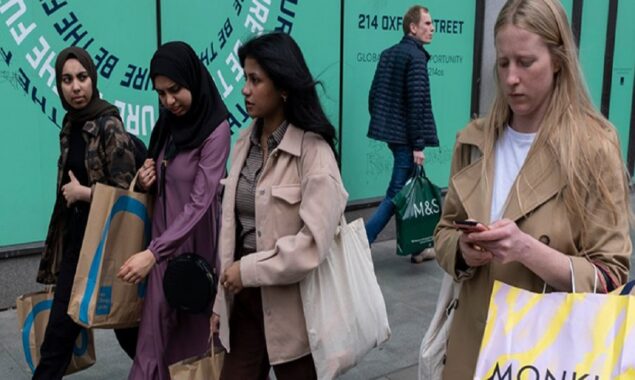First round of voting for new PM among UK Conservative
MPs to vote on who will succeed Boris Johnson on September 5....

UK economy grows but fears remain over rising prices. (credits: Google)
According to official data, the UK economy expanded in May after contracting in April and March.
The Office for National Statistics (ONS) said that the economy expanded by 0.5 percent for the month, which was stronger than the flat growth that most experts had predicted.
Every sector of the economy saw growth, including manufacturing, transport, and construction.
However, businesses claimed that increased operating expenses had forced them to increase customer pricing.
Additionally, there is “still a real risk” that the economy could enter a recession, according to Paul Dales, chief UK economist at Capital Economics, as household disposable incomes are anticipated to decrease even further in the autumn as energy prices are anticipated to rise once more.
For whoever wins the election to become the next prime minister, the economy “may prove to be a poisoned chalice,” he continued.
On Wednesday, Conservative MPs will cast their first votes in the leadership race, but whomever succeeds Boris Johnson will have to decide how to deal with the nation’s skyrocketing cost of living.
Due to record-high fuel and energy costs, prices are rising at their highest rate in 40 years, impacting both businesses and households.
Inflation in the UK, which measures how quickly prices rise, reached 9.1 percent in May and is anticipated to reach 11 percent this year.
Bank of England Governor Andrew Bailey has committed to reduce inflation to its goal level of 2%, “no ifs or buts.” Since December, it has increased rates five times, and it is anticipated that it will do so once more next month. He warned that the Bank would “act firmly,” which may include raising interest rates by more than 0.25 percent.
To help workers cope with the rising cost of living, unions are requesting pay increases. Workers have gone on strike in several industries, including the railroads, over compensation.
However, the government has cautioned against employers awarding significant pay raises due to worries about a “inflationary spiral” such to that which occurred in the 1970s, in which businesses raise wages and then pass the cost to customers through higher prices.
The UK economy “rebounded” in May, according to Darren Morgan, director of economic statistics at the ONS, with growth in all of the major industries, including construction, which witnessed an increase in home building and office renovations.
Despite test and trace and the immunisation programmes coming to an end, “health was the primary driver,” he continued.
Gross domestic product, or GDP, gauges economic activity on the part of businesses, governments, and people.
The value of all commodities and services produced by all economic sectors, including as agriculture, manufacturing, energy, and construction, as well as government and health services, is measured as part of the GDP calculation. Since we do not pay for healthcare services through the NHS, one measure of how the industry is performing is the number of GP appointments, which provides a snapshot of how that sector of the economy is faring.
Road haulage also had a “busy” May, according to Mr. Morgan, and demand for transport services increased as more individuals made plans for summer vacations.
But even as the economy expanded, several companies claimed that they had to raise client rates due to rising gasoline and power expenses.
Price hikes for metals, various foods, particularly fish, and other essentials were also noted by the UK’s statistics office.
On Wednesday, the pub giant JD Wetherspoon issued a warning that its yearly losses would be more than anticipated as a result of raising wages to recruit staff and spending a lot on maintenance and advertising.
Despite the fact that revenues were now on par with those recorded in 2019, before the pandemic hit, it claimed that employee costs were significantly higher than they were pre-Covid because businesses in the industry had to raise wages to address workforce shortages.
Nadhim Zahawi, the incoming chancellor and potential leader of the Conservative Party and prime minister, said it was “wonderful” to see the economy expanding but acknowledged that people were worried about rising prices.
In order to combat inflation, “we’re working with the Bank of England, and I’m certain we can build a better economy for everyone in the UK,” Mr. Zahawi added.
However, Labour’s shadow chancellor Rachel Reeves claimed that economic growth was “still much too slow.”
The Conservatives, she continued, “are spending every waking minute indulging in unfunded fantasy economics rather than offering the policies we need for a stronger, more secure economy.
The OECD (Organisation for Economic Co-operation and Development) issued a warning in June stating that due to consumer spending restraint and high commodity prices, the UK economy will develop less quickly than anticipated this year and stagnate the next year.
Among the major economies in the world, the UK’s GDP will develop at the slowest rate in 2023, according to the International Monetary Fund (IMF).
May’s increase was “good news,” but, according to David Bharier, head of research at the British Chambers of Commerce, it “masks major underlying issues of rising imbalances within the economy.”
He claimed that a recent study had “worrisomely” revealed a decline in longer-term company confidence.
He claimed that the current political unrest had only made small businesses’ anxiety worse.
Along with these problems, the economy continues to have severe structural problems, such as uncertainty over the UK’s relationship with the EU, ongoing Covid lockdowns in China, supply chain failures, and skyrocketing energy prices.
Catch all the Business News, Breaking News Event and Latest News Updates on The BOL News
Download The BOL News App to get the Daily News Update & Follow us on Google News.